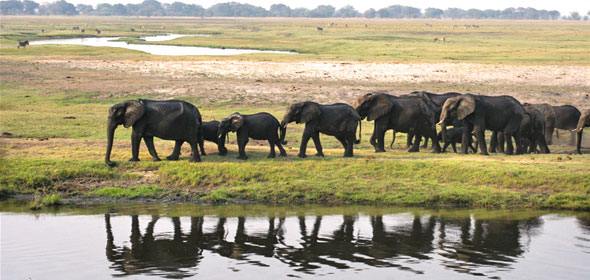Johannesburg, March 20 (BSHD NGO) – According to the Southern African Development Community (SADC), historically, tourism in Southern Africa has not received appropriate attention from governments. Given the fact that the tourism industry involves many subsectors such as transport, hospitality, trade, and manufacturing, monitoring systems have not accurately demonstrated the amount of economic activity in the SADC region generated by tourism.
Consequently, governments have not prioritised or budgeted for the development of the industry. As well, previous tourism strategies for the region have proved unsuccessful, lacking effective marketing initiatives or prioritising areas at odds with SADC’s overall objectives. The region also lacks an environment conducive to tourism, with few investment incentives and disparate policies that create barriers to cross-border travel.
Factors that help to explain the inability of the region to meaningfully increase its global and African share of tourist arrivals which therefore need to be addressed range from competition from short haul regions like North Africa, competition from other long haul destinations like South East Asia and South America,lack of targeted intensive regional marketing and promotion to match that undertaken by similar regions like the Caribbean, inadequate resources for the regional tourist organisation, RETOSA, to enable it to effectively fulfil its mandate; and lack of prioritisation of the tourism sector by some SADC Member States.
Speaking on this issue that have since seen the region only pocket 2 percent of tourist receipts and arrivals over the years, Kwakye Donkor, Marketing Director at the Regional Tourism Organization of Southern Africa (RETOSA) asserted that SADC needs an efficient network of wholesalers to design and package comprehensive multi-destination tours that attract international tourists into the region.
“At present, the Southern African region is getting 2 percent. As an organization we are striving to do all we can to ensure this number rises to 10 percent. To ensure that Southern Africa’s destinations such as the Victoria Falls, the Namib Sand Sea and the Okavango Delta get their fair share of tourist receipts and arrivals, tourism industry players consisting of government ministries, the hospitality sector, tourism investors, sustainable and community based tourism NGOs among others have to play their part,” he said.
While governments seek to harmonise regional policy on transport, with coherent frameworks for institutions and strategies for implementation. While they agree to cooperate on a transport network aimed at ensuring the free movement of people and goods through the region, Donkor said it’s important that other industry players respond to changes in product demands of different market segment tourist destinations in order to subsequently ensure that Southern Africa earns its fair share of tourism receipts and arrivals.
Such market segments range from, the Nature Based tourism (including ecotourism) for those seeking to reconnect with nature, Cultural Tourism market segment which focuses mainly on Community Based Tourism (CBT, the Volunteer and Education Tourism market segment and the Adventure Tourism market segment.
To however ensure tourism growth in Southern Africa is inevitable, Donkor suggested the following:
- Develop and Support community-based tourism.
“Solving this problem requires capacity building within communities. People should be trained and skilled to make sure that they are able to run tourism businesses, and make them economically viable and consequently sustainable in the long term,” he advised.
Adding that NGOs should be aware that community-based tourism is becoming very common among donors and funders. “Donor support could be monetary, technical, provision of resource personnel among other ways,” said Donkor, who also warned that funders sometimes get cold feet because there is always poor management in ensuring the return on investment.
- Take advantage of emerging marketing trends.
The newest marketing trend that those in the industry should be aware of is digital marketing, including social media marketing. With mobile phones many people have access to the social media. “Tourists post pictures from the summit of mount Kilimanjaro nowadays,” said Donkor.
Digital marketing cuts across television, computers, tablets, games. How these tools are used to reach the target audience is very important, he advised. However he said old methods need not be discarded, but need to be balanced with the new when coming up with solid sustainable marketing strategies.
- Educate and raise awareness.
In Donkor’s opinion, people need to be educated on tourism and on sustaining it. Education and awareness of this nature needs to start at the grassroots, he said, hence his belief that tourism should be included in primary school curriculums.
“If you want to teach people things kids are the best vehicles because they engage and talk about it innocently among themselves then they go home share with their parents and the broader family unit,” he elucidated.
Policies meant to govern tourism and sustain tourism products he said should be implemented by governments, and communities and donors should be made aware of them. Without policies and proper education, he said people will do whatever they want to the detriment of tourism products hence keeping tourists away, as such countries will have nothing to sale.
When educating nationals Donkor urged sector players to sell benefits to the people taking into consideration that each country is very diverse but with common characteristics that unite the region together.
- Create networks and partnerships.
“What helps me do my job well is the global network that I have built over the years. Building an international network makes it easy to link with organisations, institutions, and people who can always work with you to add value to the product you offer,” said Donkor, advising industry players to have a broad stakeholder consisting of an international community of funders, the private sector and the media which can help create awareness across different countries.
Of current, RETOSA is in partnership with the Japan International Cooperation Agency (JICA), UNIVISA, Exchange, United Nations Environmental Program (UNEP), Fair Trade Tourism and Boundless Southern Africa. Over the years, relations with media houses like the Tourism Tattler, DSTV, Zambezi Traveller, OPSA Business Travel in Africa, SA Golf and Leisure Vacations and Member States private and state owned media have yielded positive results. Hence Donkor highly recommends such partnerships.





